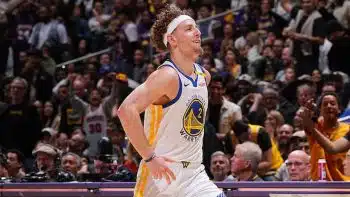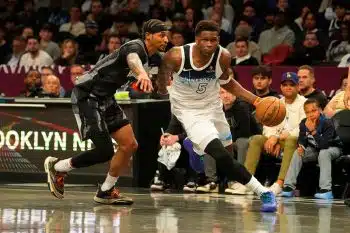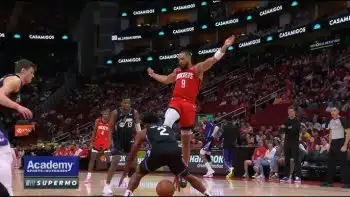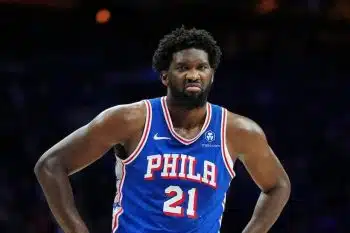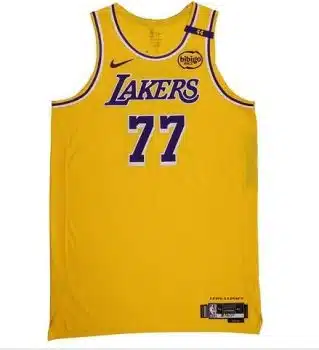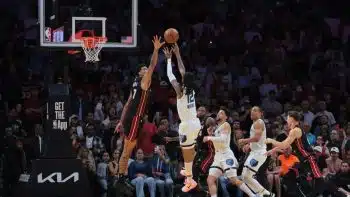NBA
Mitchell Robinson May Prove Competence of Scott Perry
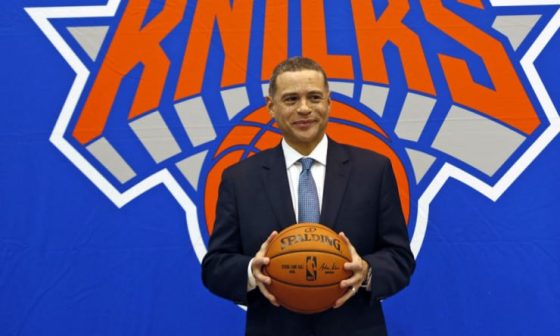
With some eye-popping performances, the neophyte simultaneously caught the attention of the New York Knicks and the observing eyes in Las Vegas.
Sure, merely a few weeks ago, he was largely considered an unknown quantity, but after an impressive stint at the Vegas Summer League, we all know his name.
It’s Mitchell Robinson.
Like his fellow rookie Kevin Knox, in short order, Robinson has caused quite a bit of a stir.
For Scotty Perry, though, he’s more than just another promising prospect; he’s the latest entry on the list of things that the newly hired general manager has gotten right.
As players like Brook Lopez and Isaiah Thomas accept contracts worth barely enough to buy LeBron James lunch, the predictions of a “nuclear winter” for NBA free agents seem to have mostly come to fruition.
For the past two summers, general managers and team executives have spent their money as if it were on fire, and as a result, we’ve seen many of the league’s teams watch their flexibility go up in smoke.
Since hiring Perry, the Knicks have done the opposite.
Time and time again, the message tossed around internally at Penn Plaza has mirrored what we’ve been told publicly—the Knicks believe they will have a serious shot at signing a marquee free agent in 2019 and have put their emphasis on shedding salary to the best of their abilities.
It took all of one summer league game for us to learn that the club had signed Robinson to a team-friendly four-year contract. According to the New York Post, the deal is only guaranteed for three years and $4.8 million. If Robinson comes anywhere near the productivity he showed in those few performances, though, the value and return on investment will be remarkably high.
If you’re keeping count, let the record fairly reflect that among Perry’s major moves for the Knicks have been trading Carmelo Anthony, hiring David Fizdale, drafting Kevin Knox and Robinson, and strategically managing his cap situation so that he could offer Robinson a contract that was so advantageous to the Knicks that some believe Robinson fired his agent as a result.
With the Knicks, Robinson will have to earn playing time and beat out Enes Kanter and Luke Kornet for minutes, but Kanter isn’t considered to be a core member for the club’s future and Kornet hasn’t exactly appeared to be the next coming of Dwight Howard, so for the rebuilding Knicks, the task doesn’t appear that difficult.
What this all means in the end is that Knox and Robinson will combine to earn just $5.4 million next season. Yet together, they’ll carry the hopes of a billion dollar franchise on their backs.
Still, you don’t need to be able to count to a billion to understand that the ROI on Robinson could be exceptional. And it’s those crafty acquisitions that could help the Knicks maintain the space they’ll need to bring a superstar to Gotham City.
Of course, time will tell, but on the continuum of unknown quantity to certain conclusion, the best you can hope for is a positive sign. Robinson, like Knox, has given us over a dozen.
Truth be told, Perry has, too. And when you realize that the selection that the club used to grab Robinson was a critical piece of the trade that sent Carmelo Anthony to Oklahoma City—a trade executed by Perry—that statement becomes all the more credible.
* * * * * *
It’s been quite some time since the Knicks had two rookies who opened eyes the way Knox and Robinson have. What’s been most pleasing about the two, however, have been the ways in which they complement one another on the basketball court.
In Vegas, Knox has impressed mostly with what he’s done on the ball, while Robinson has for what he’s accomplished off of it. The instincts and timing that Robinson has in conjunction with his athleticism are quite reminiscent of Marcus Camby.
In hindsight, we can fairly proclaim an in-prime Camby to have been ahead of his time. Camby was the prototype to which players like Tyson Chandler and DeAndre Jordan aspired.
As a big man, Camby was one of the few players in the NBA who could capably guard all five positions on the basketball court and wasn’t at the mercy of an opposing point guard when switched out on a pick-and-roll. Nobody closed space from the weakside better than Camby, and few centers in the league were able to run out and contest jumpers like him. His nimbleness and second jump ability were remarkable for a man his size, and it didn’t take long for him to find his niche playing alongside more offensively talented players such as Allan Houston, Latrell Sprewell and Larry Johnson.
We don’t know if Robinson himself will succeed in the NBA, but we do know that his archetype is the kind that does. So much of what gets young players drafted and paid in the NBA is about physics. If a guy can do one or two things better than other players his size, the job of his coaches and front office is to find ways to maximize those advantages and fit them within a team concept to exploit inferior players at his position.
It truly isn’t rocket science. When you think back even over the course of recent history, ask yourself how long it took for the world to recognize and extol the virtues of the likes of LeBron James, Dwight Howard, Anthony Davis and even Donovan Mitchell and Ben Simmons. While each representing an extreme case, the truly impactful players are able to utilize their gifts to dominate and can usually do so from day one. Certainly, they can’t do it everyday, but the potential is there and it’s evident from jump.
The most you’re gonna get from summer league is a young stud showing you that he has some exploitable advantage over his competitors. For Knox, it’s his combination of ranginess and a better than advertised nose for the ball. For Robinson, it’s the incredible agility that an extended absence from the game doesn’t seem to have blunted.
The concept of exploitable advantage is where the Golden State Warriors have run circles around the rest of the league. And although an extreme example, they are the specimen of what a team full of those types look like.
So no, while you can’t conclude that Robinson is going to end up being anything near the player that Marcus Camby was, what you can conclude is that he has the physical gifts to be effective. Whether he ends up fulfilling that potential will ultimately boil down to what Robinson has inside of him and what David Fizdale is able to do to bring it out.
Rest assured, though, to this point, Scott Perry has certainly done his job. That much is a fact.
* * * * * *
Of all words in the English language, “irony” and its adjective (“ironic”) are among those that are most often misused—irony is often confused with coincidence.
In its simplest term, irony is meant to describe a situation where there’s an occurrence that’s the opposite of what should have been expected.
In other words, back in 2015, just a few weeks after Carmelo Anthony dropped a career-high 62 points on the Charlotte Hornets at Madison Square Garden, a reporter asked him whether it was “ironic” that the Hornets also yielded 61 points to his buddy LeBron James in Miami.
That wasn’t ironic. That was just Charlotte.
On the other hand, irony was more along the lines of the Denver Nuggets seemingly becoming a better and more cohesive team after Anthony’s talents had been traded to New York. He was the team’s best player and has since proven to be a surefire Hall of Famer, yet they improved without him.
One could argue it to be ironic that Kyrie Irving welcomed a trade to the Boston Celtics after spending years battling them, or that fans of the Los Angeles Lakers have actually begun calling LeBron James the King of LA while Kobe Bryant still flies in a helicopter over Orange County.
Most appropriately, though, for a fan of the New York Knicks, irony is knowing that, despite Kristaps Porzingis being on the shelf and the Knicks not signing or trading for any big named player, there’s probably more reason to be optimistic about the club’s future than there has been in recent memory.
Yea. That’s ironic. The Knicks have always been looking for their savior—before Carmelo Anthony, it was Stephon Marbury. Infinite fanfare and declarations of grandeur. All for naught. In it all, who would have thought that the franchise’s savior could end up being Scott Perry?
Like Knox and Robinson, it’s still a bit early to certainly declare that Perry is who will lead the Knicks from the abyss.
But just like Knox and Robinson, to this point, it’d be quite difficult to argue with the early returns.
